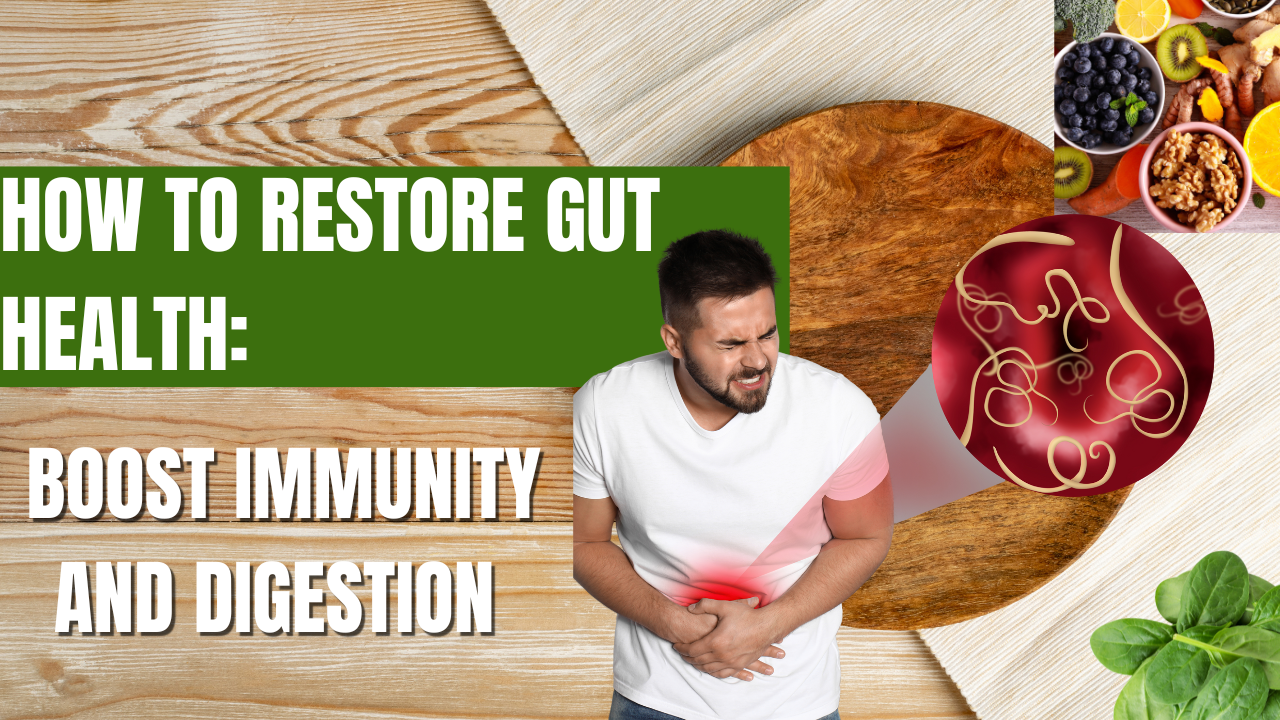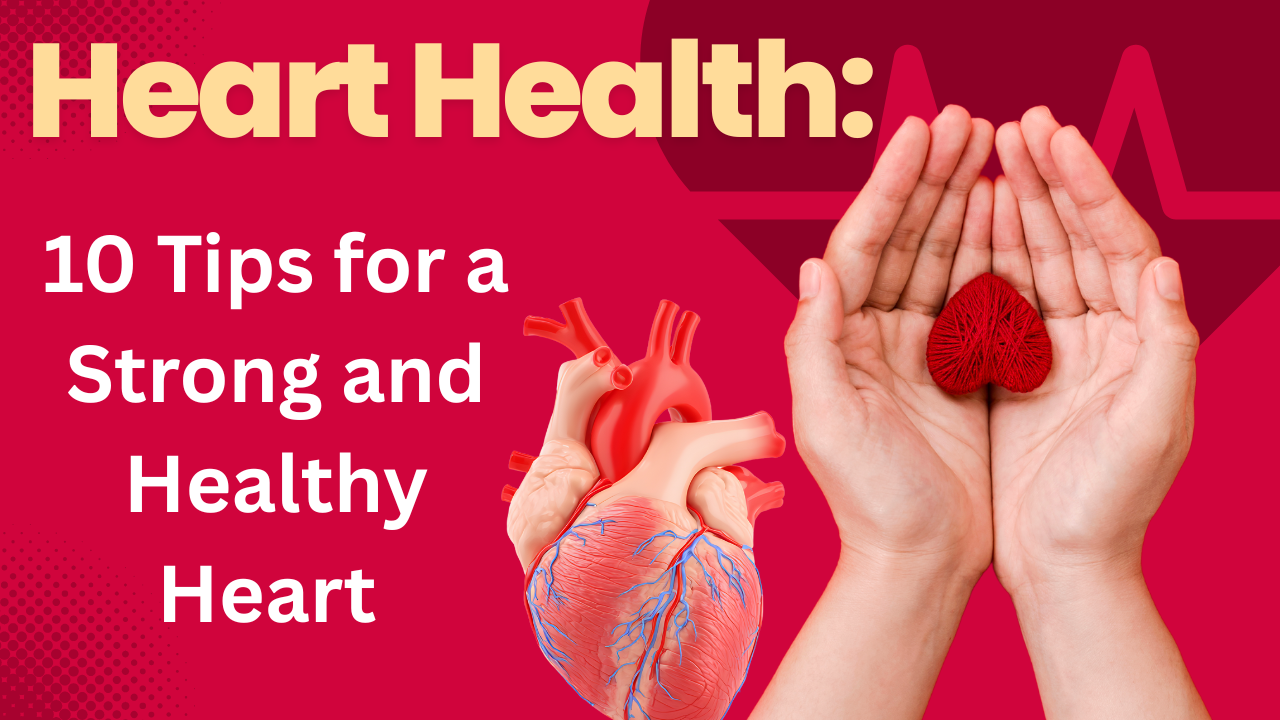Gut health is critical for overall well-being, immunity, digestion, and even mental health. Poor gut health can lead to bloating, constipation, diarrhea, fatigue, and weakened immunity. Modern lifestyles, processed foods, antibiotics, and stress often disrupt the gut microbiome—the community of beneficial bacteria in your digestive system.
Restoring gut health is not just about digestion; it affects metabolism, mood, and chronic disease prevention. By adopting proper diet, lifestyle, and targeted supplements, you can rebuild your gut microbiome, improve nutrient absorption, and reduce inflammation.
Maintaining gut health requires consistent effort. Incorporating prebiotic and probiotic foods, regular exercise, stress management, and sleep hygiene are all part of an effective gut restoration plan. This article explores 8 key tips on how to restore gut health for optimal wellness.
What is Gut Health ?
Gut health refers to the balance and proper functioning of the digestive system, including the stomach, intestines, and gut microbiome—the trillions of bacteria living in your intestines. Maintaining a healthy gut ensures proper digestion, nutrient absorption, and a strong immune system. Poor gut health can lead to bloating, gas, constipation, diarrhea, and even affect mental well-being.
A healthy gut microbiome contains a diverse range of beneficial bacteria that aid in breaking down food, producing vitamins, and protecting against harmful pathogens. When this balance is disrupted, harmful bacteria overgrow, leading to digestive issues and inflammation. Understanding what gut health entails is the first step in learning how to restore gut health effectively.
Regular monitoring of diet, lifestyle, and digestive symptoms helps identify gut imbalances early. Recognizing what impacts gut health allows you to adopt strategies that restore balance, improve digestion, and support overall wellness.

Why Restore Gut Health ?
Restoring gut health is essential because it affects nearly every system in your body. A well-balanced gut improves digestion, strengthens immunity, and supports mental health through the gut-brain axis. Unhealthy gut flora is linked to chronic diseases, fatigue, and inflammation.
Poor gut health can lead to nutrient deficiencies, as the intestines are unable to absorb vitamins and minerals efficiently. By restoring gut health, you improve nutrient uptake, energy levels, and metabolic function. Furthermore, a healthy gut helps regulate hormones, maintain a healthy weight, and reduce bloating or discomfort.
Learning how to restore gut health is crucial for long-term well-being. By addressing root causes like poor diet, stress, or antibiotic use, you can prevent recurring digestive issues and maintain a resilient gut microbiome that promotes overall health.
When to Restore Gut Health ?
How to restore gut health restoration is important as soon as you notice digestive discomfort, irregular bowel movements, bloating, or fatigue. Early intervention prevents more serious issues like chronic inflammation, IBS, or leaky gut.
Even if symptoms are mild, consistent lifestyle practices can maintain a healthy gut. Individuals recovering from antibiotics, illness, or surgery may need to prioritize restoring gut health immediately to rebuild beneficial bacteria.
How to restore gut health incorporating dietary changes, probiotics, prebiotics, and exercise regularly—ideally daily or 3–5 times a week—ensures long-term balance. Understanding when to restore gut health helps in adopting timely habits that prevent deterioration and promote optimal digestion and wellness.
How Does Gut Health Work ?
How to restore gut health works through the interaction of the gut microbiome, digestion, and immune function. Beneficial bacteria break down fiber, produce essential vitamins, and inhibit harmful bacteria, maintaining a healthy internal environment.
When gut microbiota are balanced, they improve nutrient absorption, support immune responses, and regulate metabolism. Probiotics, prebiotics, and a fiber-rich diet enhance these functions, promoting the body’s natural digestive and detoxification processes.
Learning how to restore gut health involves introducing beneficial bacteria through fermented foods, reducing harmful substances like sugar or processed foods, managing stress, and staying active. These actions support microbiome diversity and enhance the gut’s ability to protect overall health efficiently.
Where to Focus for Gut Health ?
How to restore gut health focus on the digestive tract, particularly the intestines, where most gut bacteria reside. Ensuring a diverse microbiome here is essential for overall gut function and disease prevention.
Dietary focus should be on whole foods, fiber, and fermented products that feed beneficial bacteria. Lifestyle factors like stress management, exercise, hydration, and sleep also impact gut microbiota, making the entire body environment important for gut restoration.
Understanding where to restore gut health highlights the importance of the intestinal microbiome and lifestyle factors. Prioritizing these areas ensures a strong, resilient gut, supporting digestion, immunity, and long-term wellness.
Top tips on how to restore gut health
Eat Fermented Foods

Fermented foods are rich in probiotics, which are live beneficial bacteria that help balance the gut microbiome. Consuming yogurt, kefir, kimchi, sauerkraut, and miso introduces these bacteria into your digestive system, aiding digestion and nutrient absorption. Regular intake helps restore healthy microbial diversity, which is crucial for overall digestive wellness.
To incorporate fermented foods, aim for 1–2 servings daily. Start small if you are new to probiotics to allow your gut to adjust gradually. Yogurt with live cultures at breakfast, a spoonful of kimchi with lunch, or miso soup with dinner are simple and effective ways to add probiotics to your diet.
The benefits of fermented foods go beyond digestion. They strengthen immunity, reduce bloating, and may improve mood and energy levels. Including fermented foods consistently is one of the most natural and effective strategies on how to restore gut health, supporting a resilient and balanced microbiome.
Why it works: Fermented foods like yogurt, kefir, kimchi, sauerkraut, and miso are rich in probiotics, which introduce beneficial bacteria into your gut.
How to do it: Add 1–2 servings of fermented foods daily. Start with small portions if you’re new to probiotics to allow your gut to adjust. Yogurt with live cultures, a spoonful of kimchi, or miso soup are easy additions.
Benefits: Fermented foods improve digestion, strengthen immunity, and reduce bloating. Regular consumption balances gut microbiota and may improve mood and energy levels. Incorporating them is one of the most natural ways on how to restore gut health.
Include Prebiotic Foods

Prebiotics are dietary fibers that feed beneficial gut bacteria, encouraging growth and diversity. Foods like garlic, onions, asparagus, bananas, and oats contain prebiotics that act as fuel for your microbiome, improving digestion and immune function. Including prebiotics daily helps maintain a healthy gut environment.
In practice, you can incorporate prebiotic-rich foods into meals by adding onions and garlic to soups or stir-fries, enjoying oatmeal with bananas for breakfast, or snacking on raw asparagus or leeks. These small dietary adjustments support beneficial bacterial growth and overall gut health.
Prebiotics and probiotics work synergistically. While probiotics add beneficial bacteria, prebiotics provide the nutrients for these bacteria to thrive. Regularly including prebiotic foods in your diet is an essential part of learning how to restore gut health, promoting balance, nutrient absorption, and digestive efficiency naturally.
Why it works: Prebiotics are fibers that feed beneficial gut bacteria. Foods like garlic, onions, asparagus, bananas, and oats promote bacterial growth and diversity.
How to do it: Incorporate prebiotic-rich foods into your meals daily. For example, add onions and garlic to soups or stir-fries, enjoy oatmeal with bananas for breakfast, or snack on raw asparagus or leeks.
Benefits: Prebiotics enhance nutrient absorption, support immune function, and reduce inflammation. They work synergistically with probiotics, forming a foundation for healthy gut microbiome restoration. This is essential for those learning how to restore gut health naturally.
Stay Hydrated
Proper hydration is vital for digestive function. Water supports nutrient absorption, maintains healthy gut lining, and aids in the smooth movement of food through the intestines. Drinking enough fluids ensures waste is eliminated efficiently, preventing constipation and promoting regular bowel movements.
Aim for 2–3 liters of water daily, adjusting based on activity level, climate, and body weight. Herbal teas such as ginger or chamomile can also contribute to hydration while offering gut-soothing properties. Drinking water consistently throughout the day keeps digestion active and healthy.
Hydration works in synergy with diet and probiotics to maintain a balanced microbiome. Consistently staying hydrated is a simple yet essential tip on how to restore gut health, reducing bloating, supporting metabolism, and optimizing overall gut function naturally.
Why it works: Water supports digestion, nutrient absorption, and waste elimination. Proper hydration keeps the intestinal lining healthy and promotes movement through the digestive tract.
How to do it: Drink at least 2–3 liters of water daily, adjusting for climate, activity level, and body weight. Include herbal teas like ginger or chamomile for added gut-soothing effects.
Benefits: Staying hydrated prevents constipation, reduces bloating, and improves gut function. Hydration complements diet and probiotics in restoring gut microbiome health, making it a key tip on how to restore gut health.
Limit Processed and Sugar-Rich Foods
Processed foods, artificial sweeteners, and refined sugars feed harmful gut bacteria, disrupting the microbiome and promoting inflammation. A diet high in processed foods can lead to digestive issues, bloating, and poor nutrient absorption, negatively affecting gut health over time.
Replace sugary snacks with whole fruits, nuts, and grains. Choose minimally processed meals, avoid sodas, and carefully read labels to avoid hidden sugars and additives. Small, gradual changes are easier to sustain long-term while supporting a healthier gut environment.
Reducing sugar and processed foods restores microbial balance, decreases inflammation, and supports better metabolism. Limiting these foods is critical for anyone looking to learn how to restore gut health effectively, promoting a resilient digestive system and overall wellness.
Why it works: Processed foods, artificial sweeteners, and refined sugars feed harmful gut bacteria, leading to dysbiosis and inflammation.
How to do it: Replace sugary snacks with fruits, nuts, and whole grains. Choose whole, minimally processed foods, avoid sodas, and check labels for hidden sugars and additives.
Benefits: Reducing sugar intake restores microbial balance, prevents inflammation, and improves metabolism. Limiting processed foods is crucial for anyone serious about how to restore gut health effectively.
Take Probiotic Supplements (If Needed)

Probiotic supplements provide targeted beneficial bacteria that help restore microbial diversity, especially after illness, antibiotics, or digestive imbalances. They complement dietary efforts, supporting the gut microbiome for improved digestion and immune function.
Choose a high-quality probiotic with multiple strains and adequate CFU (colony-forming units). Follow instructions on whether to take on an empty stomach or with meals, or as advised by a healthcare professional. Consistency is key for supplements to have a meaningful effect.
Probiotics aid with bloating, IBS, and post-antibiotic recovery. Using supplements judiciously is an effective strategy on how to restore gut health, especially when dietary sources of probiotics are insufficient, helping rebuild and maintain a balanced and healthy gut microbiome.
Why it works: Probiotic supplements introduce targeted beneficial bacteria strains, supporting gut microbiome diversity and function.
How to do it: Choose a high-quality probiotic with multiple strains and sufficient CFUs (colony-forming units). Take as directed on an empty stomach or as recommended by a healthcare professional.
Benefits: Probiotics help with IBS, bloating, and antibiotic recovery. They reinforce natural gut bacteria and complement dietary efforts, making supplements a practical part of how to restore gut health.
Manage Stress
Chronic stress negatively affects gut health through the gut-brain axis, altering microbial balance and reducing digestive efficiency. High stress levels can lead to inflammation, discomfort, and nutrient malabsorption, impacting overall wellness.
Stress management techniques like mindfulness, meditation, yoga, deep breathing, or journaling help regulate cortisol levels, supporting digestion and microbial diversity. Even 10–15 minutes of daily relaxation can produce noticeable benefits for gut health.
Incorporating stress management is essential for those learning how to restore gut health holistically. By reducing inflammation and improving nutrient absorption, regular stress control enhances digestion, strengthens immunity, and promotes a healthier, balanced gut microbiome.
Why it works: Chronic stress negatively impacts gut health through the gut-brain axis, altering microbial composition and reducing digestive efficiency.
How to do it: Practice mindfulness, meditation, yoga, deep breathing, or journaling. Regular relaxation techniques help regulate cortisol and support digestive health.
Benefits: Stress management reduces inflammation, improves nutrient absorption, and enhances microbial diversity. It’s a crucial lifestyle strategy for learning how to restore gut health holistically.
Get Regular Exercise
Physical activity positively influences gut health by stimulating motility, supporting microbial diversity, and improving metabolism. Exercise encourages regular bowel movements, reducing bloating and enhancing digestive efficiency.
Engage in at least 30 minutes of moderate-intensity activity most days, including walking, cycling, swimming, or strength training. Consistent movement complements a healthy diet and probiotic intake, creating a synergistic effect for gut health.
Regular exercise is a natural method on how to restore gut health. It strengthens digestion, supports a diverse microbiome, boosts energy, and works together with lifestyle and dietary habits to maintain a resilient and healthy gut system.
Why it works: Physical activity stimulates gut motility, supports microbial diversity, and improves metabolism.
How to do it: Engage in at least 30 minutes of moderate-intensity exercise most days of the week. Walking, cycling, swimming, or strength training are all effective.
Benefits: Exercise promotes healthy digestion, reduces bloating, and boosts beneficial gut bacteria. Combining movement with diet is an effective strategy for how to restore gut health naturally.
Ensure Adequate Sleep
Poor sleep negatively affects gut microbiota composition, disrupting circadian rhythms and contributing to inflammation. Chronic sleep deprivation is linked to digestive discomfort, reduced immunity, and imbalanced gut bacteria.
Aim for 7–9 hours of quality sleep per night. Establish a consistent bedtime routine, limit screen exposure before sleep, and create a relaxing environment to support deep, restorative rest. Quality sleep enhances digestive function and microbial health.
Adequate sleep complements other gut-restoring strategies like diet, hydration, and exercise. Prioritizing rest is a key factor on how to restore gut health, improving digestion, reducing stress, and ensuring your microbiome remains balanced for overall well-being.
Why it works: Poor sleep disrupts circadian rhythms and negatively affects gut microbiota composition, contributing to inflammation and poor digestion.
How to do it: Aim for 7–9 hours of sleep per night. Maintain a consistent sleep schedule, avoid screens before bed, and create a relaxing bedtime routine.
Benefits: Adequate sleep improves digestion, reduces stress, and supports microbiome balance. Healthy sleep hygiene complements all other tips on how to restore gut health.
Conclusion

Restoring gut health is essential for digestion, immunity, energy, and overall wellness. By combining diet, probiotics, prebiotics, hydration, and lifestyle changes, you can rebuild a healthy gut microbiome.
Consistency is key. Regularly incorporating fermented foods, fiber-rich prebiotics, and limiting processed foods will help maintain microbial diversity. Exercise, stress management, and adequate sleep reinforce these dietary efforts.
By following these 8 tips on how to restore gut health, you can reduce digestive issues, prevent chronic inflammation, and improve both physical and mental well-being. A balanced, sustainable approach ensures long-term gut health success.
FAQs
Q1. How long does it take to restore gut health ?
Most people see improvement in digestion and energy within 3–6 weeks with consistent diet and lifestyle changes.
Q2. Can I restore gut health without supplements ?
Yes, fermented foods and prebiotics alone can support gut microbiome recovery. Supplements may accelerate the process.
Q3. Does stress affect gut health ?
Yes, chronic stress disrupts gut bacteria and digestion; stress management is essential.
Q4. Are probiotics safe for everyone ?
Generally, yes, but consult a doctor if you have a weakened immune system or serious health conditions.
Q5. How important is fiber for gut health ?
Fiber is crucial; it feeds beneficial bacteria and promotes regular bowel movements, helping restore gut health.



